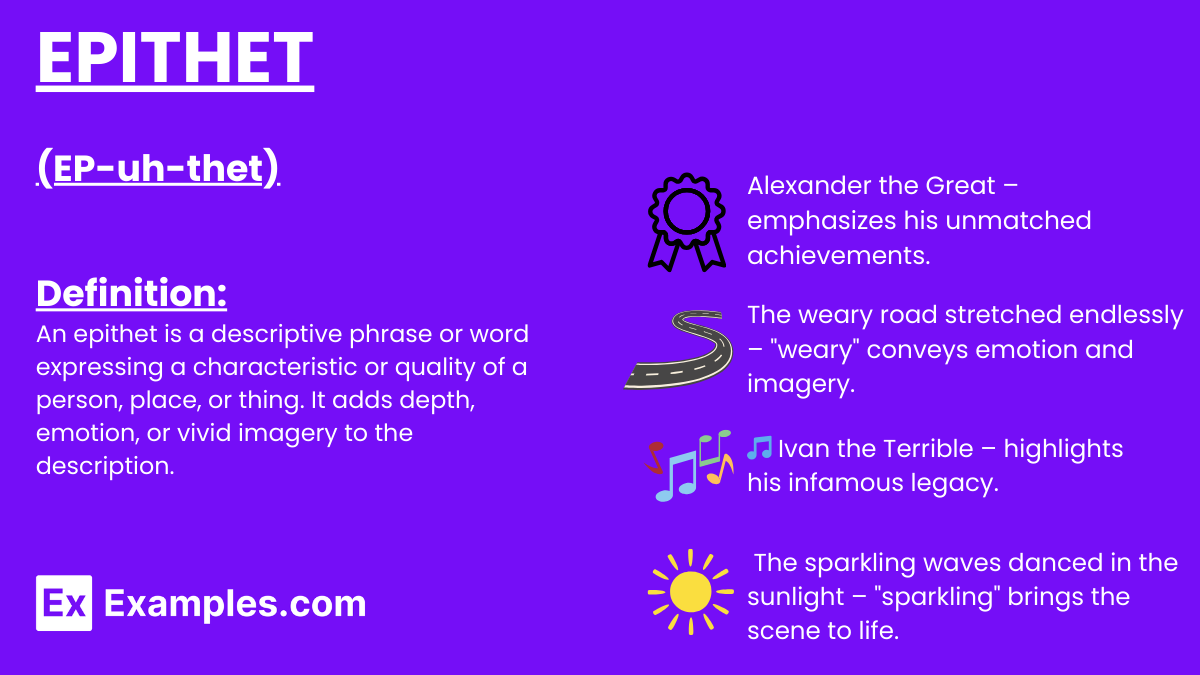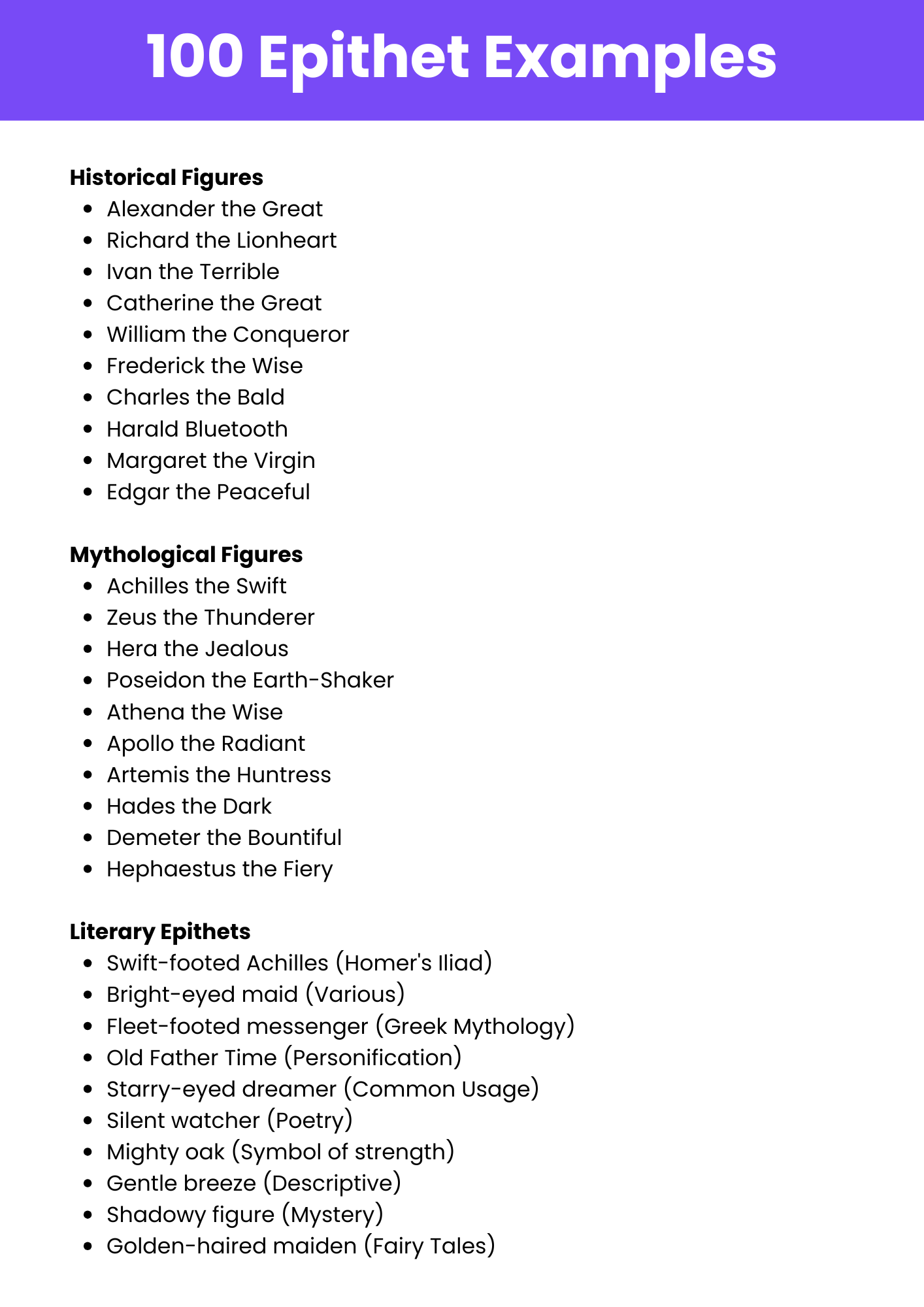Epithet
What is Epithet? – Definition
An epithet is a literary device that uses a descriptive phrase or adjective to characterize a person, place, or thing. It often highlights a particular quality or attribute, adding depth and vividness to the narrative or poetic expression.

Generated Epithet Examples

Examples of Epithet
- Alexander the Great
- Swift-footed Achilles
- Dark and stormy night
- The Iron Duke
- Richard the Lionheart
- Old King Cole
- The Bard of Avon
- The Great Wall
- The Red Sea
- The Sweet Singer
- The Golden Fleece
- The Silver Spoon
- The Bright Star
- The Flying Dutchman
- The Green Knight
- The Mighty Thor
- The Silent Forest
- The Whispering Wind
- The Eternal Flame
- The Shining City
- The Wise King
- The Golden Eagle
- The Silent Knight
- The Fierce Dragon
- The Radiant Sun
- The Brave Warrior
- The Gentle Breeze
- The Majestic Mountain
- The Burning Heart
- The Shining Knight
Types of Epithet
Standard Epithet
A standard epithet is a commonly used descriptive phrase or adjective that characterizes a well-known figure, place, or thing.
- Alexander the Great
- Richard the Lionheart
- The Iron Duke
- The Bard of Avon
- The Flying Dutchman
Implied Epithet
An implied epithet is a descriptive term that is not explicitly stated but is understood through the context of the narrative.
- Silent night
- Gentle breeze
- Golden sunrise
- Whispering trees
- Burning candle
Epithet with Imagery
Using epithet to enhance visual or sensory imagery in literature, adding depth and vividness to descriptions.
- The crimson sunset
- The silver moonlight
- The emerald forest
- The azure ocean
- The golden fields
Epithet in Free Verse
Using epithet to maintain a free-flowing structure in free verse poetry, enhancing natural expression and imagery.
- The silent night envelops the weary traveler
- Morning dew kisses the blossoming flowers
- Twilight shadows dance across the deserted streets
- Autumn leaves whisper secrets to the chilly breeze
- Stars illuminate the vast, silent sky
Epithet in Different Genres
Using epithet effectively across various literary genres such as narrative poetry, lyrical poetry, and experimental poetry.
- In narrative poetry, epithets help in building vivid characters and settings.
- Lyrical poetry uses epithets to convey deep emotions and personal reflections.
- Experimental poetry employs epithets to challenge traditional forms and introduce innovative expressions.
- Free verse maintains fluidity and natural speech patterns through continuous descriptive phrases.
- Narrative prose enhances readability and engagement by using epithets to enrich descriptions.
Epithet in Contemporary Literature
Exploring the use of epithet in modern and contemporary literary forms to add depth and character.
- Modern authors often use epithets to create memorable characters and immersive settings.
- Contemporary poetry utilizes epithets to enhance emotional resonance and thematic complexity.
- Epithets in modern narratives help in building distinct voices and unique perspectives.
- Thematic depth and character development are amplified through the strategic use of epithets in contemporary works.
- Epithets in contemporary literature guide readers’ interpretations and enhance narrative engagement.
How to Identify/Find Epithet?
To identify epithet, look for descriptive phrases or adjectives that characterize a person, place, or thing. Pay attention to how these descriptions add depth and vividness to the narrative or poetic expression.
- Look for adjectives or descriptive phrases that accompany nouns, enhancing their meaning.
- Check for phrases that consistently describe a character, object, or setting.
- Analyze how the descriptive terms contribute to the overall imagery and tone.
- Notice if the description highlights specific attributes or qualities.
- Identify common epithet patterns used by authors to build characters and settings.
How to Use Epithet?
Use epithet to enhance your writing by adding descriptive depth and vividness. It allows you to create memorable characters, settings, and objects, enriching the reader’s experience.
- Incorporate epithets to highlight important traits or features of characters and settings.
- Use epithets to create vivid imagery that engages the reader’s senses.
- Integrate epithets to develop and deepen character personalities and backgrounds.
- Ensure that epithets contribute to the overall theme and mood of your work.
- Balance epithets with other descriptive elements to maintain readability and impact.
Other Epithet Examples
Epithet in Daily Writing
Everyday writing can utilize epithets to enhance narrative flow and reader engagement.
- The shining sun warmed the bustling city streets
- The quiet library was filled with eager students
- The fragrant flowers bloomed in the serene garden
- The towering mountains stood against the clear blue sky
- The bustling marketplace was alive with vibrant colors and sounds
Epithet Examples for Kids
Introduce children to epithets with simple and relatable examples that demonstrate descriptive depth.
- The fluffy bunny hopped across the green meadow
- The bright rainbow appeared after the rain
- The playful kitten chased the colorful yarn
- The shiny apple fell from the tall tree
- The gentle breeze rustled the colorful leaves
Epithet Examples for Students
Provide students with examples that showcase the versatility and depth of epithets in academic writing.
- The relentless pursuit of knowledge drives scientific advancements and innovation.
- The resilient community rebuilt their homes after the devastating hurricane.
- The innovative approach to teaching fosters critical thinking and creativity in students.
- The profound impact of literature extends beyond entertainment, influencing societal values and beliefs.
- The intricate design of the architecture reflects the cultural heritage and artistic expression of the region.
Epithet Examples for Class 4
Age-appropriate and engaging epithet examples for younger students to grasp the concept easily.
- The happy dog wagged its tail
- The colorful butterfly fluttered in the garden
- The big elephant walked slowly through the forest
- The bright sun shone down on the playground
- The fluffy cat curled up in the cozy blanket
Explore Other Literary Devices
Elevate Your AP English Preparation
Unlock your potential with our comprehensive AP English exam preparation tools designed to help you excel.
- Extensive Question Bank: Access 900+ exam-like questions for both AP English Language and Literature.
- Expertly Crafted: Questions mirror the structure and difficulty of actual AP exams, ensuring relevant practice.
- Detailed Explanations: Understand your mistakes with clear, concise breakdowns of correct and incorrect answers.
- Personalized Learning: Tailor your study sessions with topic-specific tests and adaptive learning tools.
- Comprehensive Coverage: Master all aspects of the AP English curriculum with extensive guides and resources.
Frequently Asked Questions
-
What is an epithet?
An epithet is a literary device that uses a descriptive phrase or adjective to characterize a person, place, or thing. It often highlights a particular quality or attribute, adding depth and vividness to the narrative or poetic expression. -
How does an epithet differ from a nickname?
While both epithets and nicknames are descriptive, epithets are typically used within literary contexts to emphasize specific traits or characteristics, whereas nicknames are informal names used in everyday life. -
Why are epithets important in literature?
Epithets add descriptive detail that enhances imagery and characterization. They help to create vivid pictures in the reader’s mind and can emphasize particular qualities of characters or settings, enriching the overall narrative. -
How can I effectively use epithets in my writing?
To effectively use epithets, ensure that they are relevant and enhance the description without overloading the text. Use them to highlight key traits or features that contribute to character development or setting description. -
Can epithets be used in prose?
Yes, epithets can be effectively used in prose to add descriptive depth and enhance character and setting descriptions, making the narrative more engaging and vivid.

